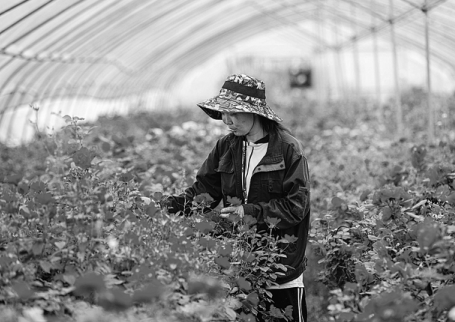Hebei horticulture brightens up rural economy

Kong Ya'nan, a 31-year-old mother in Handan, North China's Hebei province, said that she works among a mass of flowers every day, and the beautiful plants bring her great joy.
"I can't tell you how happy I am," she said.
Kong works at a flower nursery farm in Nanxiluobao village in Feixiang town, Feixiang district of Handan, a rural area about 400 kilometers southwest of Beijing.
Kong came to work at the farm in 2018.
"At first, I didn't know a thing about planting or taking care of the flowers, although I know how pretty they are," Kong said.
She only did work that didn't require skills, such as putting mature rose plants into flowerpots that were to be sold.
Living in Xinmiao village, about 6 km away from the farm, she rides an electric bicycle to work every day at 8 am and can get home at around 5 pm. A single journey takes her about 20 minutes.
"It's very convenient for me," she said, adding that she needs to send her two children to school before work and pick them up after work.
Showing guilt on her face when mentioning her boy and girl, Kong recalled that in the past, she used to work as a migrant worker in other cities. "Now I can see them and take care of them every day."
Treasuring the opportunity to work near home, Kong made every endeavor to learn new skills for nurturing roses, a major flower at the farm.
After two years, she was promoted to supervisor for the growth of roses in a greenhouse, and was made responsible for all kinds of flower management work, including cutting propagation, grafting, irrigation and insect prevention.
"The workload is not heavy for me thanks to increased mechanization at the farm, and I can earn more than 3,000 yuan ($451) per month," she said.
"When working in other cities, I could save about 20,000 yuan throughout a year," she added. At present, she can save about 40,000 yuan at the end of a year.
Last year, Kong and her husband bought a car with their savings. "Our life is getting better and better," she said.
Like Kong, more than 1,000 residents in nearby villages have benefited from the farm, which provides them with stable jobs and satisfactory salaries.
The farm, named Colorful Garden Flowers and Seedlings Planting Base, is now covered by more than 200 hectares of roses in full bloom.
The flowers have created revenue not only for the owner but also for other local residents.
Wang Jianming, owner of the farm, said annual income of the farm reached 20 million yuan last year. Its flowers are sold to many provinces including Henan, Shandong, Shanxi and Guangdong.
"The flowers have not only become popular for sightseeing, but they are also the 'happy-making flowers' that drive us to get rich together," he said.
According to Wang, the farm now boasts more than 3,000 species of flowers and nursery stocks, with the plants' number reaching 90 million.
Wang has also rented 133 hectares from local villagers. "In addition to employment if they work here, they can also get rent and receive dividends at the end of the year."
Wang Guanhua, head of Feixiang town where the farm is located, is also happy to have such a large-scale farm in town. "It has helped promote rural vitalization by creating jobs and bringing tourists."
In the past two years, the town hosted two cultural festivals with the farm playing a major role. "The festivals attracted more than 50,000 visitors who bought flowers and also visited other tourist sites in our town."
"The agricultural resources have promoted rural tourism," the head of the town said.
According to the agricultural department of Feixiang district, the district's soil and weather are suitable for flower growth.
At present, it has more than 500 hectares of land planted with flowers, mainly roses and chrysanthemums.
The industry has created at least 3,000 jobs for local residents and has greatly promoted rural tourism, the department said.































